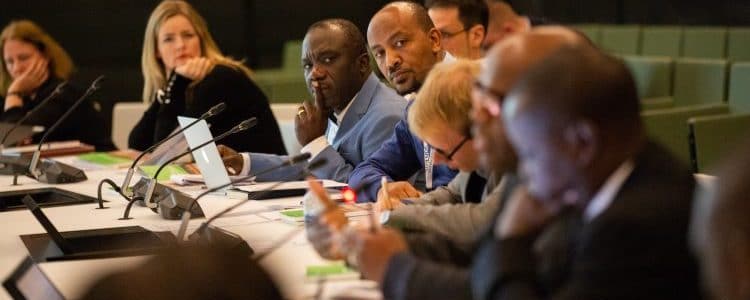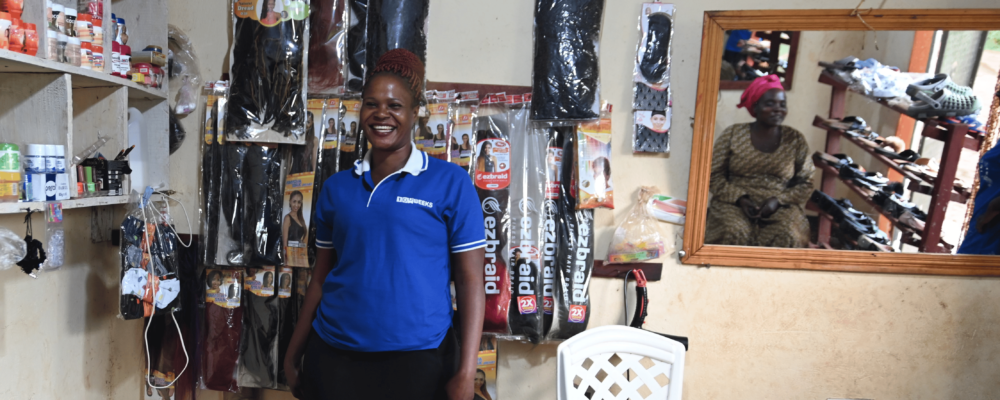
While Africa has experienced high rates of economic growth in the past decades, inequality is increasing, the absolute number of poor people is growing and many Africans are being left behind. For Africa’s development to be inclusive, investments in productivity and the sectors driving economic growth need to be complemented by inequality reduction through redistribution and access to basic services.
These were some of the conclusions of the conference ‘From research to practice: inclusive development for future prospects in Africa’, held on 21 November at the Netherlands Ministry of Foreign Affairs (MFA). This conference covered inclusive development in its full form, including country case studies, eight thematic breakout sessions and many different subjects. It canvassed various social and economic issues such as productivity in the agricultural sector, investments in infrastructure, employment for youth and women, cash transfers, education and maternal health. The researchers from the various INCLUDE research projects, who finalized their research in 2018, engaged in lively discussions with representatives of the MFA and INCLUDE platform members.
In their keynote addresses, Antonie de Kemp from the Policy and Operations Evaluation Department (IOB) of the MFA and Marleen Dekker from the INCLUDE Secretariat helped to dismantle several misconceptions about Africa’s development:
- First, the theory of ‘trickle down’ effects is unfounded: without additional interventions from policymakers and practitioners, Africa’s economic growth does not automatically benefit the poor. Often, this economic growth exclusively benefits political and economic elites, both inside and outside Africa.
- Second, the relationship between economic growth and poverty and inequality reduction is unclear. As stated by de Kemp: “Economic growth is important for poverty reduction. Yet, countries like Burkina Faso and Senegal have been able to reduce poverty without high growth rates”. In comparison, the economies of countries like Ethiopia and Rwanda have grown substantially, although poverty has not declined proportionally.
- Third, if the non-income dimensions of poverty are considered, a slightly different picture of Africa’s poverty emerges. Using the Multidimensional Poverty Index (MPI), the IOB study ‘Transition and inclusive development in Sub-Saharan Africa’ portrays a more positive picture for countries like Ghana and Tanzania than when looking only at income poverty (see Figure 2). These countries have relatively high scores for MPI dimensions such as health care, education and standard of living. On the other hand, countries like Ethiopia and Burkina Faso have higher levels of poverty when using the MPI.
- Fourth, countries with high poverty levels do not necessarily have high inequality levels, and vice versa. While high poverty is concentrated in areas such as the Sahel and countries like Mozambique, the Democratic Republic of the Congo and Ethiopia (see Figure 1/2), inequality levels are high in the south of Africa (see Figure 3).
| Figure 1. Poverty levels in Sub-Saharan Africa
Source: IOB, 2018
|
Figure 2. Multidimensional poverty levels in Sub-Saharan Africa 
|
Figure 3. Inequality levels in Sub-Saharan Africa
|
These different pathways of development between countries were further elaborated on in a panel discussion, in which Sarah Ssewanyana (Economic Policy Research Centre/INCLUDE), Assefa Admassie (Ethiopian Economic Policy Research Institute/INCLUDE) and Nicky Pouw (University of Amsterdam) reviewed the findings of the IOB study on Uganda, Ethiopia and Burkina Faso, respectively. These panel members outlined further issues, such as the spatial development of poverty in Uganda, the role of large public expenses in the economic growth of Ethiopia, and inequality in growth and productivity between urban and rural areas in Burkina Faso. In the same panel, Njuguna Ndung’u (African Economic Research Consortium/INCLUDE) stressed that true inclusive development is endogenous and starts by empowering African smallholder farmers, while at the same time addressing institutional failures.
These debunked ideas about the relationship between economic growth, poverty and inequality opened up for a discussion on a new agenda for development in Sub-Saharan Africa. The IOB study concluded that for this development to be inclusive, a focus on six policy domains is required (see Table 1). This list relates strongly to the six policy domains identified as the main domains to promote inclusive development by INCLUDE in 2013 (see Table 2) and to the key messages of the eight researchers of the INCLUDE research projects presented in the morning plenary session.
| Table 1. Policy domains identified in IOB, 2018 | Table 2. Policy domains identified by INCLUDE, 2013 |
| 1. Increasing agricultural productivity | 1. Economic growth with a focus on structural transformation |
| 2. Creating employment opportunities | 2. Productive employment |
| 3. Investment in infrastructure | 3. Social protection |
| 4. Investment in education | 4. The provision of basic services |
| 5. Investment in health care and sexual and reproductive health and rights | 5. Territorial development and spatial equity |
| 6. Support of cash transfer programmes | 6. Quality governance |
While many participants showed approval of the policy agenda outlined by de Kemp and the IOB study, several participants made suggestions for sharpening it. For instance, Paschal Mihyo (Research on Poverty Alleviation /INCLUDE) argued that the issue of international trade regulations was missing: in order to increase exports, producers need to be able to comply with international standards. Moreover, he argued that production should take place in Africa, rather than exporting raw materials. Rolph van der Hoeven (International Institute of Social Studies/INCLUDE) noted that the IOB study concluded that while good governance is associated with low levels of poverty in the world, the opposite is true in Africa. In the discussion that followed, two notions were put forward: First, that the quality of governance can be measured in various ways, resulting in very different scores for good goverance. Second, there needs to be attention on what Melle Leenstra (MFA) called the “box of donor decision making”, and how this relates to decision making by African governments.

© Roos Trommelen
In separate breakout sessions in the afternoon, the conference revolved around what policy messages could be identified to improve design and implementation in the various policy domains. This resulted in fruitful elaborations on what policies and practices could work and why, as well as how these could be implemented and how political will could be created to push them.
In the closing panel, formed by Reina Buijs (Director General of International Development of the MFA), Désiré Assogbavi (United Nations Population Fund) and Marc de Tollenaere (Organization for Economic Cooperation and Development), Reina Buijs emphasized the importance of an agenda for inclusive development, alluding to its introduction in the Netherlands agenda for international development cooperation by former Minister Lilliane Ploumen. Moreover, she underlined the importance of interactions between researchers and policymakers, as took place in this conference. Currently, the MFA strongly priorizes evidence-based decision making, asking “how can we use existing information and let it be the backbone of our policy?”. Désiré Assogbavi confirmed this importance, and argued that researchers, knowledge brokers and practitioners need to keep finding different ways to contact policymakers and create civic space. In order to do so, INCLUDE’s chair Isa Baud, in closing the conference, stressed that we need to continue making strategic alliances across and between Africa and the Netherlands.













